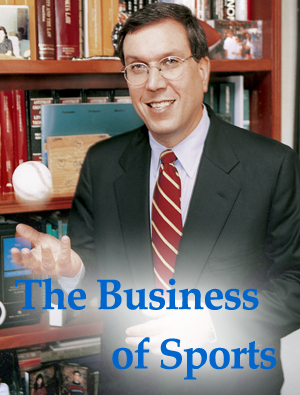|
|
 |
 |
 |
 |
|
Jeffrey
Kessler '75: Antitrust By Jonathan Lemire '01 Like a screeching alarm clock that provokes grumbles and curses when it goes off each morning, talk of sports labor issues seems to dominate the back pages of newspapers and the banter on SportsCenter every few years, waking annoyed fans from their blissful contemplation of Allen Iverson’s jump shot and Pedro Martinez’s fastball. If the fans can get beyond their anger at the headlines and read the articles that spell out the major issues and players of the labor strife, they might notice that one name, Jeffrey Kessler ’75 ’77L, is ubiquitous. Architect of the NBA’s free agency and salary cap system. Ditto for the NFL. Latrell Sprewell’s attorney. Counsel for the aggrieved former owners of the Montreal Expos and the players’ union for the Arena Football League. In the sports labor world, he seemingly is always there when something important happens. “Sports is a gigantic business that pumps billions of dollars into the economy yearly and has the ability to make a lot of people happier in their daily lives,” says Kessler, 48, a partner at the New York law firm of Weil, Gotshal, and Manges L.L.P. “It’s a tremendously important industry, and what I’ve learned is that economic justice — a free market — is always a good thing. Rights have to be protected.” Kessler freely admits that he became perhaps the leading sports attorney in the country completely by accident. Born in Brooklyn and unwilling to leave the city for college, he chose Columbia for the simple reason that “it was — and still is — the best college in New York.” There, events both in and outside of the classroom steered him to a career in law. As a political science major, Kessler was exposed to a pair of classes — Alan Westin’s constitutional Law course and Mark Kessleman’s political science seminar — that introduced him to the possibility that law could change people’s lives for the better. That notion was reinforced during the 1971–72 union strikes at Columbia in which Kessler, as chair of the rules committee in the student senate, had to establish regulations for demonstrator conduct, making him, he said, a target for scorn from liberal students and conservative administrators. “I was all set for a career in law,” Kessler recalls dryly. In 1976, during a summer break from the Law School, Kessler took a position as a summer associate at Weil, Gotshal, and Manges. When hired upon graduation, he became an anti-trust lawyer, taking on cases in fields such as intellectual property, international trade law and trade regulation. Perhaps Kessler’s most noteworthy role was as defense counsel in Zenith v. Matsushita in 1986, in which Zenith accused Japanese electronics companies of a worldwide conspiracy to keep United States companies out of their markets. The landmark case, which Zenith lost when it eventually was argued in front of the United States Supreme Court, not only established the tenet that competition that lowers prices cannot automatically be inferred as conspiracy, but also put Kessler on the map as one of the preeminent antitrust lawyers in the nation. “If you scratch me, I will first bleed as an antitrust lawyer,” he says. “It’s also what got me into sports litigation. In the world of pro sports, antitrust has become a great legal avenue for those aggrieved by sports leagues, which, by and large, tend to be monopolies.” Kessler’s firm had been retained by the NBA Players Association in the mid-1970s during the negotiations that led to the Oscar Robertson settlement, which, argued as an anti-trust case, gave pro basketball players their first glimpse of free agency. Kessler was then assigned to provide legal advice to the players in the years after the agreement, giving him his first taste of the sports world. He came back for more almost immediately, helping the North American Soccer League win a case against the NFL in 1978 that challenged a provision prohibiting NFL team owners from owning teams in other professional sports leagues. A few years later, Kessler successfully represented NBA star Bob Lanier and the NBA Players Association when they challenged the league’s ability to impose a salary cap without consulting the union. In 1988, Kessler — now as a partner at Weil, Gotshal, and Manges — negotiated for the players what would become the blueprint for the NBA’s salary cap and free agency system. [ 1 | 2 ]
|
|
|||||||||||||||||||||||||||||||||||||
